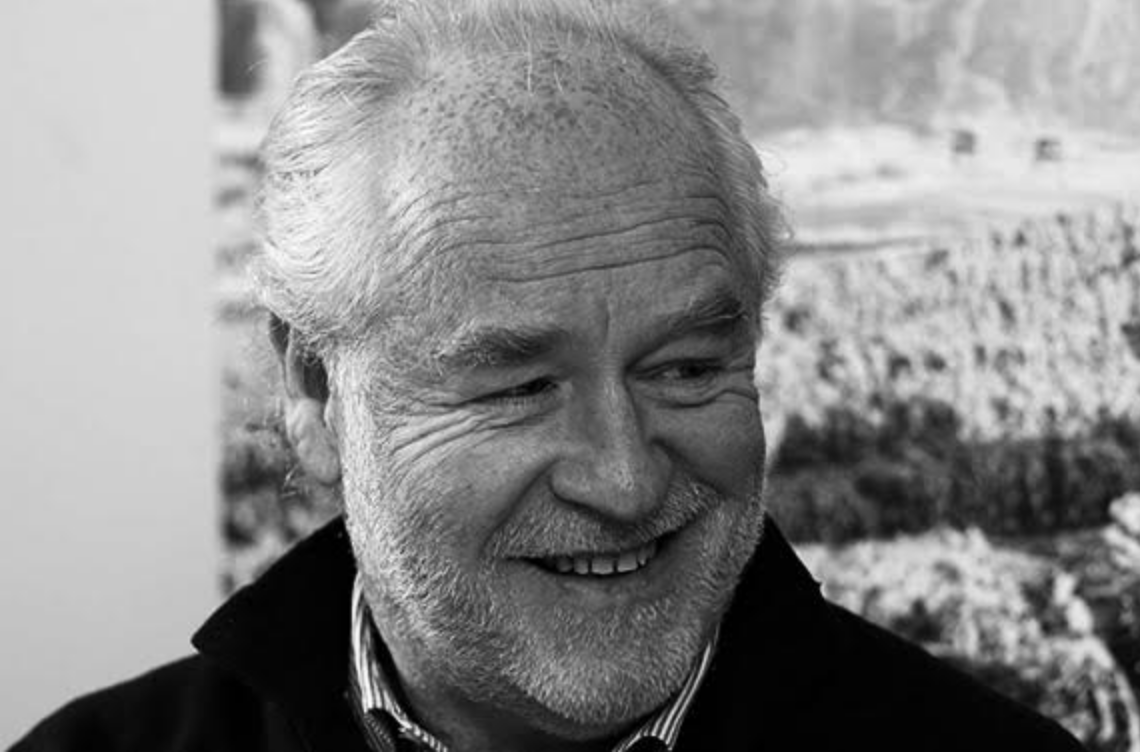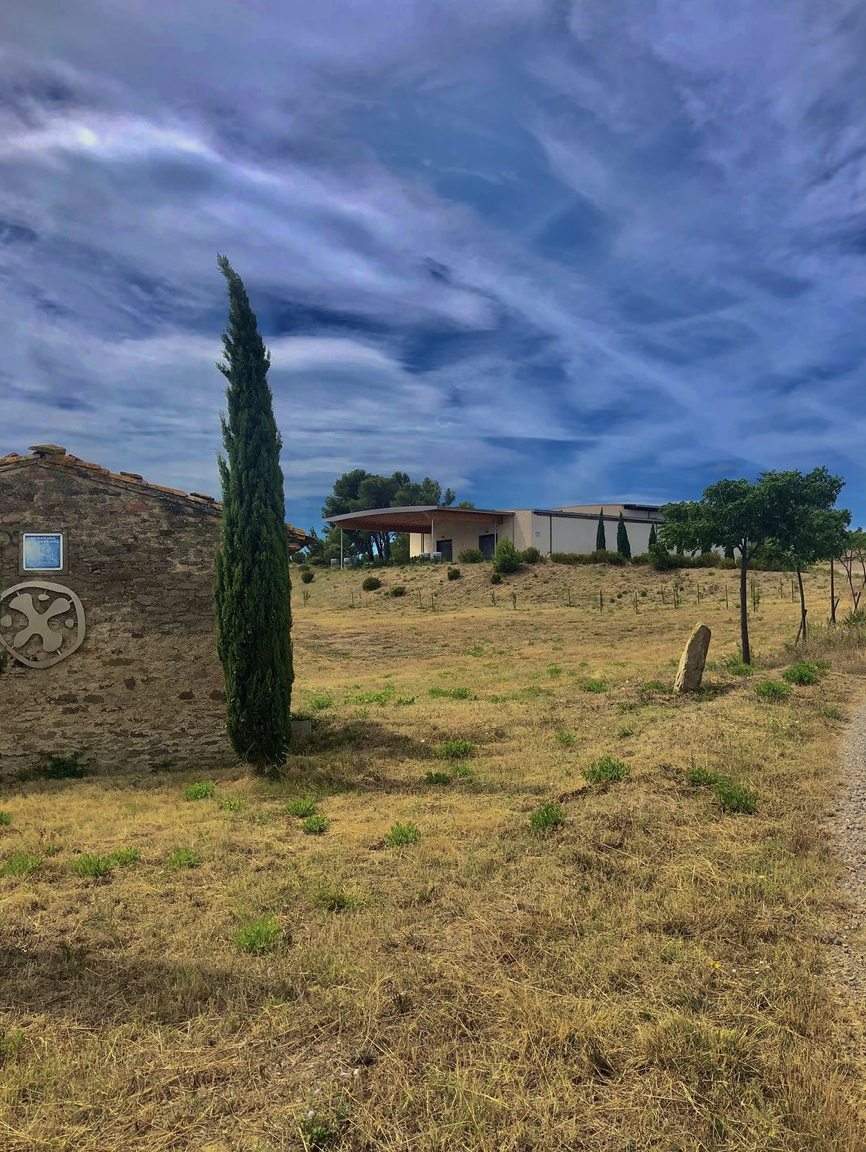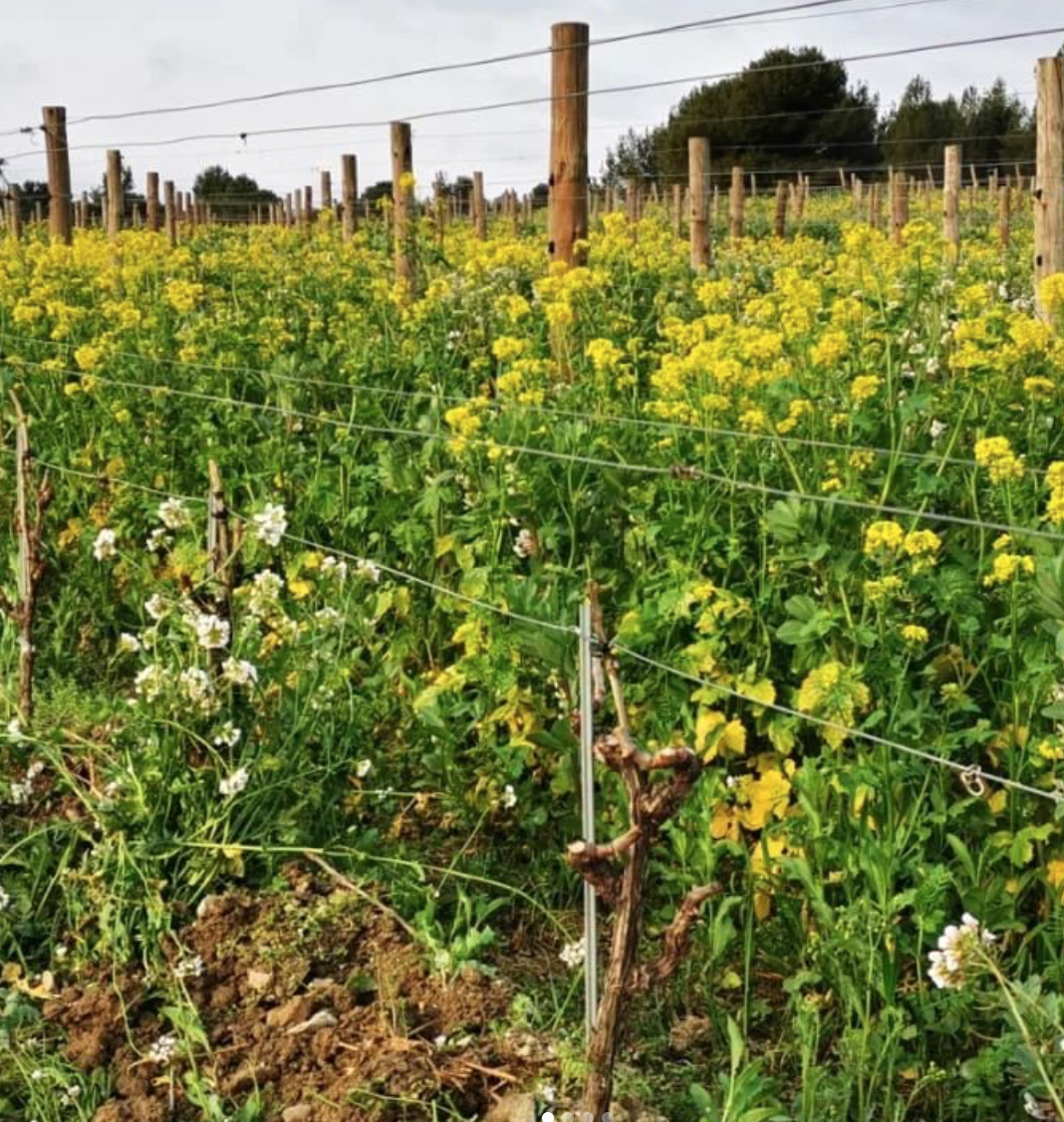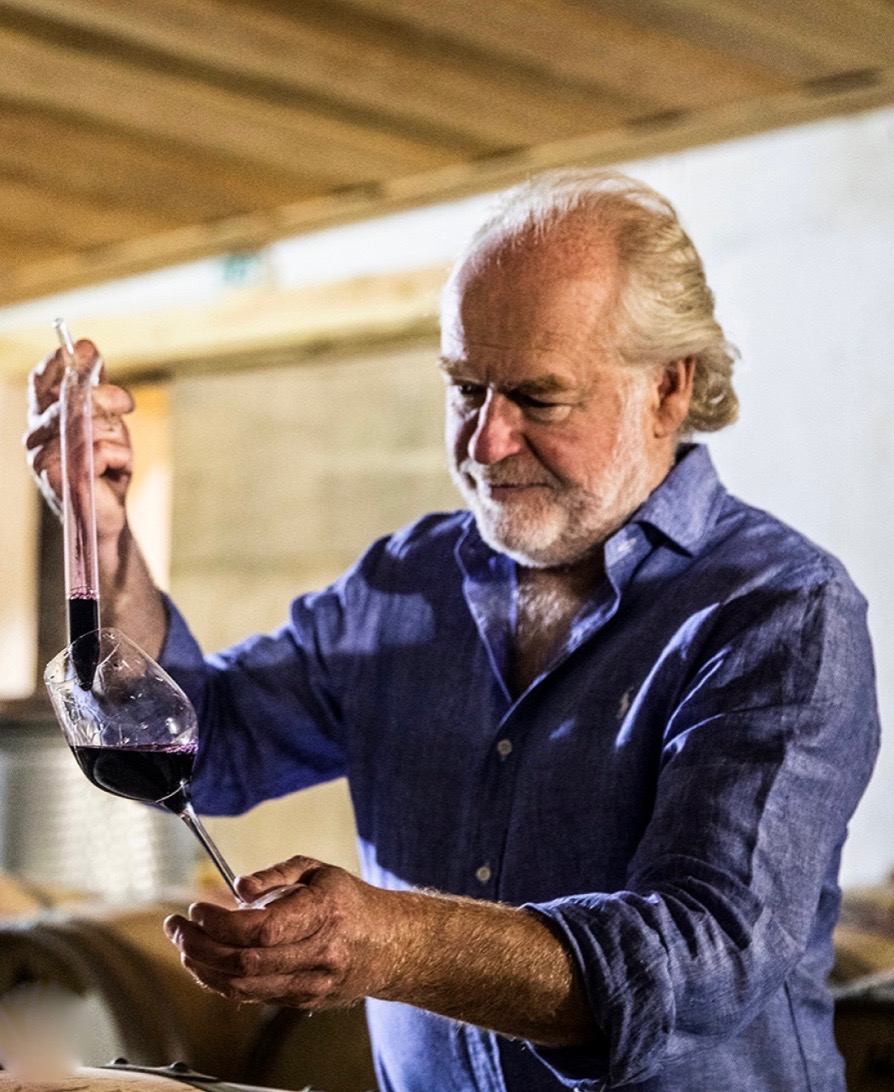Château Maris, nestled in the heart of the Languedoc region in southern France, stands as a beacon of sustainable winemaking practices and organic viticulture. Situated near the picturesque village of La Livinière, this esteemed winery embodies a harmonious blend of tradition, innovation, and environmental stewardship.
Purchased by Robert Eden in 1997, Château Maris has quickly gained recognition for its commitment to organic and biodynamic principles. Eden, an Englishman with a passion for winemaking and environmental sustainability, transformed the estate into a showcase of ecological viticulture. From the meticulous care of the vines to the gentle handling of grapes during harvest, every step of the winemaking process reflects a profound respect for the environment. The vineyards are cultivated without the use of synthetic chemicals, relying instead on natural composts, cover crops, and herbal preparations to nourish the soil and promote biodiversity.
At Château Maris, the pursuit of excellence extends beyond environmental stewardship to the art of winemaking itself. Under the guidance of Eden and his skilled team, the estate produces a diverse range of wines that showcase the richness and complexity of the Languedoc terroir. From elegant reds imbued with notes of black fruit and spice to crisp whites redolent of citrus and minerality, each bottle reflects the passion and dedication of those who tend the land.
Grape Collective discusses organic and biodynamic viticulture with Robert Eden at Château Maris.
Christopher Barnes: What is the philosophy behind Chateau Maris?
 Robert Eden: The philosophy is to make great wine. There we go. That's it. Done, nice to meet you. No, we have a philosophy which really begins with acknowledging life which surrounds us and acknowledging all life forms. And by acknowledging all life forms, you can then say we're respecting the environment. You can then say we're respecting the ecosystem. You can then say that we're understanding that we're not this dominant controlling species that believes it has the ability to control.
Robert Eden: The philosophy is to make great wine. There we go. That's it. Done, nice to meet you. No, we have a philosophy which really begins with acknowledging life which surrounds us and acknowledging all life forms. And by acknowledging all life forms, you can then say we're respecting the environment. You can then say we're respecting the ecosystem. You can then say that we're understanding that we're not this dominant controlling species that believes it has the ability to control.
(Robert Eden)
We're more the species which realizes that it is a participant in this ecosystem that we have our part to play and that we should play our part. But we understand that that part is one which respects all other parts of the ecosystem.
And how did Chateau Maris come about?
Well, it existed before because the owner was called Monsieur Maris and we bought it in 1997. As an estate, Mr. Maris had created it in the late seventies.
Was it organic when you bought it or did you convert it?
Absolutely not. It was completely the opposite. And that's something which I would like to have understood better when I bought it. But no, unfortunately, the previous owner had several other occupations and so he was using quite large numbers of pesticides and quite large quantities of chemical fertilizer.
And therefore he destroyed the life which surrounds the plant. And so the plants were living in this sterile environment. And when you live in a sterile environment, you're not very happy and you know very well, you're not very healthy. And if you're not happy and healthy, you're not going to produce great grapes. And so, no, Maris was not organic when we bought it, and we had to convert it to organic because it was the only way to bring life back to the ecosystem.
And when did you move from organic to biodynamic?
Almost straight away. Because the rejuvenation of life in the soil came through live compost. And one of the ways of making live compost is the biodynamic method of agriculture and infusing the plant-based preparations to Steiner-based preparations into the compost pile. And we found that actually, they produce the most potent form of fertilizer, live fertilizer that we could get.
And so, yeah, that was what led us to say, wow, if biodynamics, the method itself can transform a pile of manure into a very potent live fertilizer let's investigate further what really this whole method of agriculture is all about. So we did that for a couple of years, looking at the compost piles, analyzing the compost potential and going back and forth.
And then we said, well, okay, this biodynamic compost pile is always the best. It's always the one which has the most nitrogen. It's always the one which has the most microorganisms per square centimeter. Let's study further what this method of agriculture is.
 And you also built your winery from hemp. Is that correct?
And you also built your winery from hemp. Is that correct?
That is correct.
What was the thinking behind that?
It is two thoughts. One is the fact that we had a winery before which wasn't built of hemp, and I didn't feel that it was right to do what we were doing in the vineyards and then bring the grapes into this building, which had no relation to what we were doing with the vineyards, that the building was a completely different space.
It was a very efficiently built space, a prefab concrete, etc. and it actually worked as a vinification unit from a practical point of view. But it wasn't living and breathing what we were living and breathing through the methods which we were practicing in the vineyards. And so that didn't rhyme. And therefore I searched for what we were going to do in order to replace that building.
And I came across this hemp lime brick, which is very, very efficient, from a 360 point of view. It's very efficient to make a brick. It was very efficient to build the brick, and it's a very efficient building after the building is built.
And it's wonderful to be in a building which is alive. It's a vegetable-based building, so it's a plant-based building, which is recyclable because we could knock the whole building down and put it all back into the earth and the wooden support systems we could use for something else.
Yeah, we had a plant-based, recyclable building, and that to me corresponds totally with the ethos and the methods that we're practicing in the vineyards.
And talk a little bit about the terroir in the part of the Languedoc where you are growing your grapes.
Basically you've got the sea about a hundred kilometers as the crow flies. And then very close, ten kilometers as the crow flies you've got the mountain range, the Black Mountains. La Liviniere, it's an argile calcaire. So it's a clay and chalk-based soil nestled in against these hills which go from about 280 meters to 1,200 meters in altitude very quickly.
 So you've got a very unique climatic condition of very cool evenings during the hot period, because in particular, as the Syrah ripens, its skin ripens very quickly. That means probably that you don't quite necessarily get all the even ripeness that you want because the skins are ripening quickly.
So you've got a very unique climatic condition of very cool evenings during the hot period, because in particular, as the Syrah ripens, its skin ripens very quickly. That means probably that you don't quite necessarily get all the even ripeness that you want because the skins are ripening quickly.
And so you've got to, you got to pick the grapes perhaps before you've got that optimum, even ripeness. So, the beauty of having this cool elevation so close of means that your nights cooler and the nights being cooler means that you can stretch the ripening period longer and therefore you get that, which is to me typical of La Liviniere, which is that the name of the terroir, you get that voluptuousness, you get that velvetines, you get that sensuality, you get that smooth, seductive, delicious tasting wine from the terroir.
You also make a no added sulfur wine, talk a little bit about that.
Well, we discovered some time ago, back in about 2004, that adding sulfur in the process of vinification was actually destroying the ability for the tannin molecules basically to act in the way they should act and was actually stopping the tannin from developing as it should.
And so we stopped vinifying with sulfur and then when you stop vinifying with sulfur, you continuously every year add sulfur later and later in the process. And so yeah, if you've started vinifying in, you know, September, October, and then you start tasting this tank in February again, that's rather delicious actually. You know why don’t I bottle it?
So in 2016, we decided to bottle our first, no added sulfur wine, but, you know, all our wines for ten, 12 years before were still vinified with sulfur. We were only adding sulfur either during the aging process or just at bottling. For instance, the Brama Grenache Gris has about a 24 month period of aging before it goes into bottle and no sulfur is added during that period until bottling.
Sometimes you can have issues with bacterial infections of the wine with no sulfur added wines. How do you avoid that?
 By keeping everything extremely clean throughout the process, Everything, all the equipment you use, your tanks, your taps, your pipes, your pumps, everything is extremely clean. So you're not getting infections, as it were, from the outside. And then prior to bottling, we will filter our wines. We will filter them naturally, but we will filter the wines in order to filter out any other potential, as much as possible. Bacterial bacterial growth which may be happening or bacterial activity which may be happening in the juice at the time.
By keeping everything extremely clean throughout the process, Everything, all the equipment you use, your tanks, your taps, your pipes, your pumps, everything is extremely clean. So you're not getting infections, as it were, from the outside. And then prior to bottling, we will filter our wines. We will filter them naturally, but we will filter the wines in order to filter out any other potential, as much as possible. Bacterial bacterial growth which may be happening or bacterial activity which may be happening in the juice at the time.
And do you consider yourself a natural winemaker?
Yes. I mean no. (Monty Python!). You know, coming back to the point that we are part of the ecosystem. If our ecosystem is natural, we're a natural part of it. Do you see what I mean? If you're going into the ecosystem and you're dominating it and you're coming from a position of control, then you're not natural. I think natural is not “We're cultivators,” right? We can't cultivate with a rewilding hat on.
Do you see what I mean? We've got to act. We have to participate. The natural way for me is participating, is respecting all life forms which are surrounding you.
Talk a little bit about some of the grapes that you work with.
We have Syrah and Grenache. We also have a bit of Carignan and we have the Grenache Gris to do the white wine. I still need to do greater in-depth studies of different rootstocks. I need to do more tastings and develop more of an understanding of all the availability which is out there, in the form of the different hybridization in terms of different rootstocks of the different sub-varieties of each variety.
I'm not an expert at that level. What I do love is, you know, Syrah is interesting because it makes these immensely strong, powerful wines and at the same time there it is, you know, requiring trellising. If not, it falls apart. You know, its skin is very feeble and it rots very quickly.
So you've got this sort of rather weak variety, which needs a lot of protection through the growing process, which makes these massively powerful wines.
And then you've got Grenache, which is extremely sturdy and courageous and strong and resilient in a lot of ways. And it makes this delicate, sensitive, succulent, delicate fruit. It's nice being involved with the ecosystem as we are connected to the plants and to understand the sensitivity of the plants and to understand the work that we're doing above ground and below ground plays to that plant sensitivity.
And that's what we're really trying to do. We're really trying to connect through our method of viticulture with the plants. So the plant is in a good space and reacting to it.
I think the most important thing is to understand that it's all about a living space, that for me is the important part. That for me, making wine today and growing grapes today is what it is all about. And the living space is also about the community in which you live. There's also the terroir. It's also the villages. it's all that. And that's an important part of wine. We must not make wine in this isolated bubble and not have connections with anything else which is going on around. We must be connected to all life that is going on around us.














